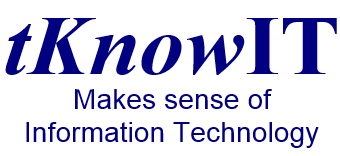Using a computer on the internet – Trust yourself
Many people I encounter don’t trust the internet and refuse to use internet banking or order products and services online whilst others are doing everything online and click on every free music download offering and trying to get that Tax refund that HM Revenue & Customs apparently owe them. Hopefully you are somewhere between the two.
No anti-virus software can be 100% effective and, technically, most computer infections are no longer virus-based but come from Worm, Trojan, key-loggers and Bot attacks – commonly grouped together as Malicious-ware or malware. You should still have security software installed though and I would recommend that you use a paid-for offering and go for an Internet Security Suite which generally will include anti-virus, anti-spyware, spam filtering and a firewall. (less than £40 to cover 3 home PCs).
Even though the security software auto-updates it is best to manually run an update once a month to make sure it works, then run a full disk scan. Some infections can turn off updaters or fool the system into thinking all is well.
The rest is down to you with some caution and common sense.
Don’t open emails from unknown senders (especially if you have never given them your email address) – just delete them. If it was important then they’ll probably phone you.
Pause before you click a link in an email, on a google-type search or social-networking website. Is it really from who you think it is? The majority of infected machines I encounter at the moment are due to rogue facebook links. A sign of this can be a prompt to install a ‘plug-in’ to allow you to open a photo or video from a friend – bad idea – stop and run a full scan of your PC.
Make sure you regularly backup your documents and photos just in case.
